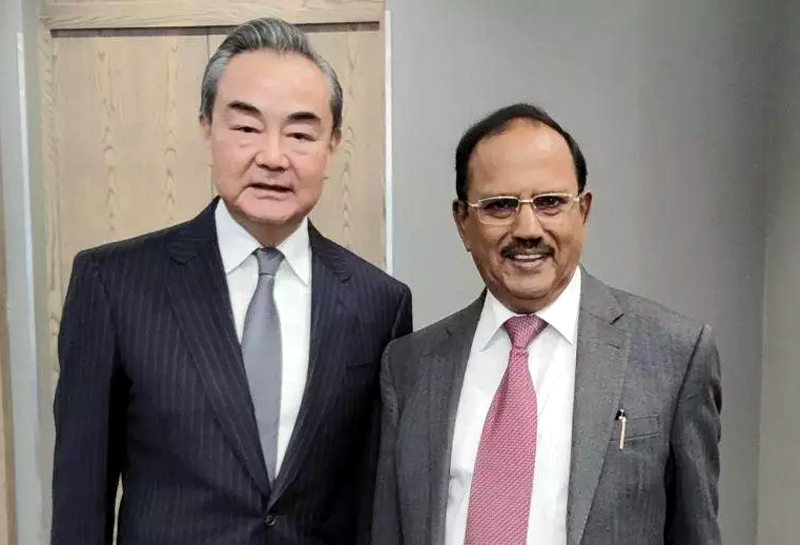BEIJING, Dec 19: Following his vital discussions with Chinese Foreign Minister Wang Yi aimed at normalizing relations, National Security Advisor Ajit Doval departed from Beijing on Thursday. China noted that the statements released by both nations after the meetings contained “very much similar gist and elements,” indicating a broader agreement.
The Special Representatives addressing the border issue, Wang and Doval, engaged in “substantive talks” and achieved a six-point “consensus” regarding the China-India boundary matter characterized by a “positive and constructive attitude,” as articulated by Foreign Ministry spokesperson Lin Jian at a media briefing regarding the discussions’ outcomes.
He mentioned that “the two sides’ readouts share very much similar gist and elements.” Following the discussions, China confirmed that a six-point consensus was established between the parties involved.
Lin emphasized the importance of directing both countries’ valuable resources towards development and revitalization, ensuring that the boundary concern is appropriately placed within bilateral relations, jointly maintaining peace and tranquility in the border regions, and striving to restore China-India relations to a stable and healthy path promptly.
Doval left Beijing on Thursday, with the Special Representatives dialogue being significant as it marked the first structured interaction between the two nations after more than four years of staled relations due to the military standoff in eastern Ladakh.
Established in 2003 to thoroughly address the complex disputes of the India-China border, which spans 3,488 km, Wednesday’s meeting was the 23rd conference between the two nations after a gap of five years.
Long Xingchun, a professor from the School of International Relations at Sichuan International Studies University, remarked on the discussions, stating that resuming the Special Representatives’ meeting signals both sides’ willingness and confidence to resolve border disputes through peaceful negotiations.
He noted that the meeting fosters mutual trust between the two nations and contributes to maintaining peace and tranquility in border regions, as stated in an interview with Global Times.
Qian Feng, the director of the research department at the National Strategy Institute of Tsinghua University, pointed out that after the meeting between PM Narendra Modi and President Xi Jinping in Kazan, the Special Representatives’ meeting was held shortly thereafter, reflecting both sides’ active engagement in resolving the border issue and taking steps to restore mutual trust.
“This is a positive indication for the early return of China-India relations to a healthy developmental trajectory,” Qian elaborated.
He also noted that the Special Representatives’ meeting serves as an essential platform for both sides to discuss solutions to the boundary issue and enables direct communications between the heads of diplomatic and security affairs.
“Hence, this meeting is anticipated to set the groundwork for deepening common interests between the two nations and to continue advancing cooperation across various sectors,” Qian added.
Wang Shida, a researcher at the Institute for South Asian Studies at the China Institutes of Contemporary International Relations, asserted that the easing of tensions between China and India is in the best interest of both countries.
“With over 1.4 billion people in each nation, development should be the common ground between these neighbors,” Wang explained to the state-run China Daily.
He emphasized that resuming talks is pivotal for unlocking cooperation potential across many areas.
The six-point consensus highlighted by Lin included a positive assessment of the resolution reached on October 21 which ended the prolonged military standoff in eastern Ladakh, reaffirming the commitment to continue implementing the agreement.
Other areas of agreement involved appropriately managing the boundary question in relation to overall bilateral ties without hindering development, and taking ongoing measures to ensure peace and tranquility in border regions to foster the healthy and stable growth of bilateral relations.
Both sides reaffirmed their commitment to continue seeking a fair, reasonable, and mutually acceptable package settlement for the boundary question, following the political parameters and guiding principles agreed upon by the countries’ special representatives in 2005, while actively working to advance this process.
The two parties evaluated the border situation and agreed to enhance the management rules for border areas, strengthen confidence-building measures, and achieve lasting peace and tranquility along the border.
They also agreed to maintain and improve cross-border communication and cooperation, bolster the Special Representatives’ meeting mechanism, and convene a new round of Special Representatives talks in India next year. (PTI)


Leave a Reply